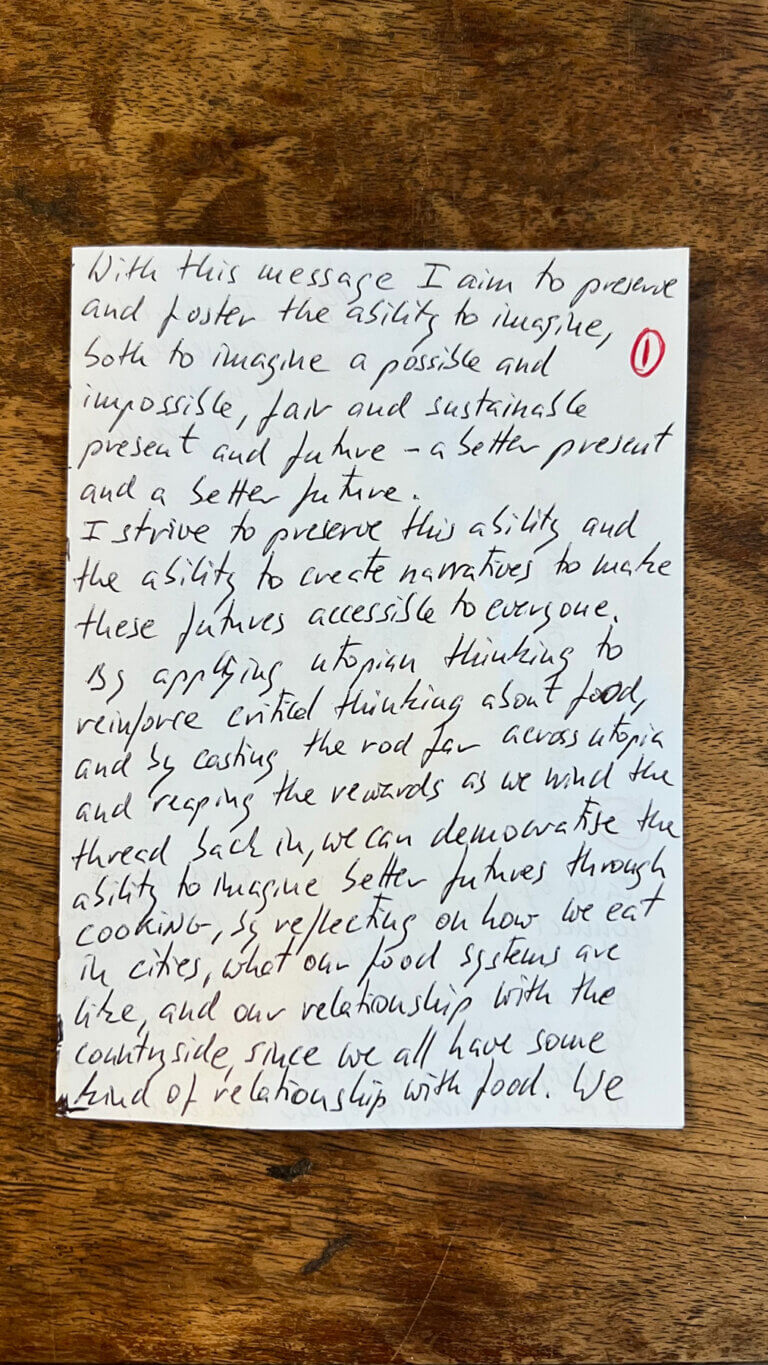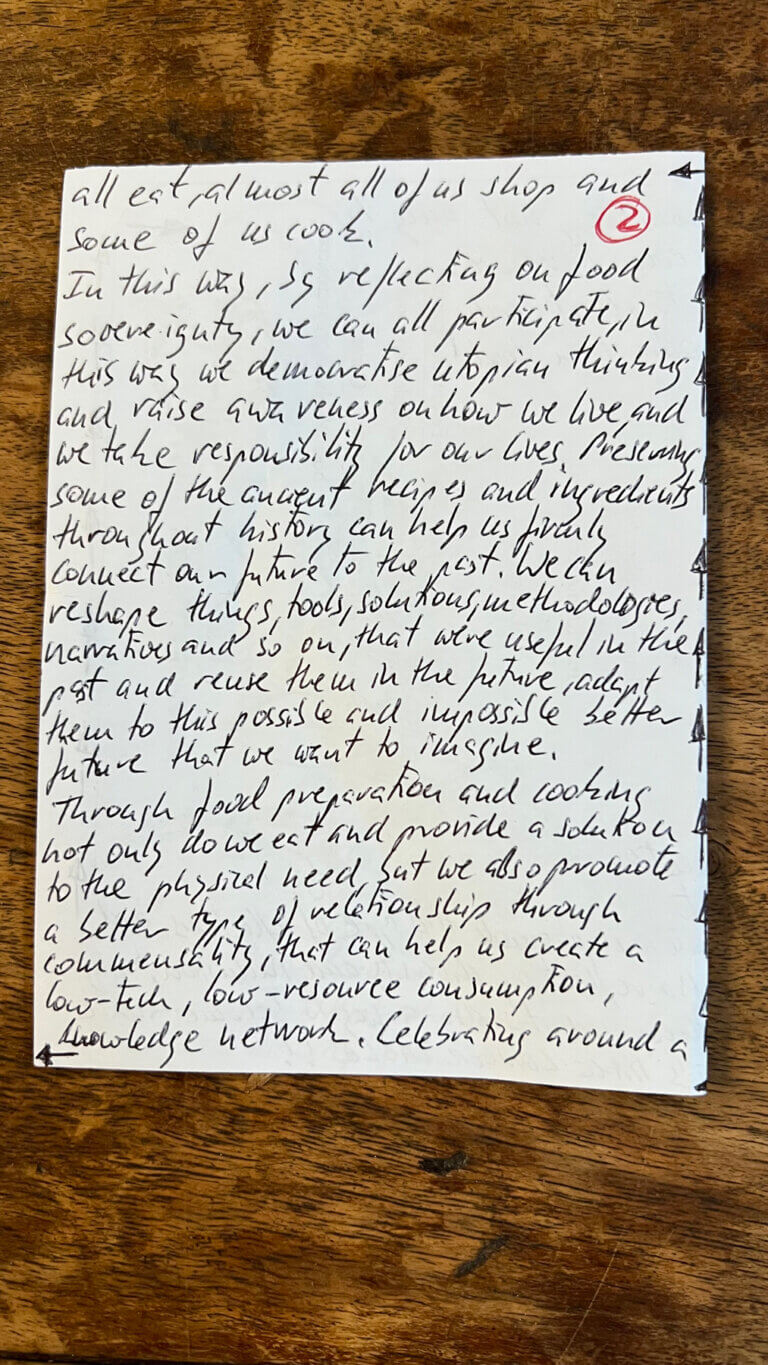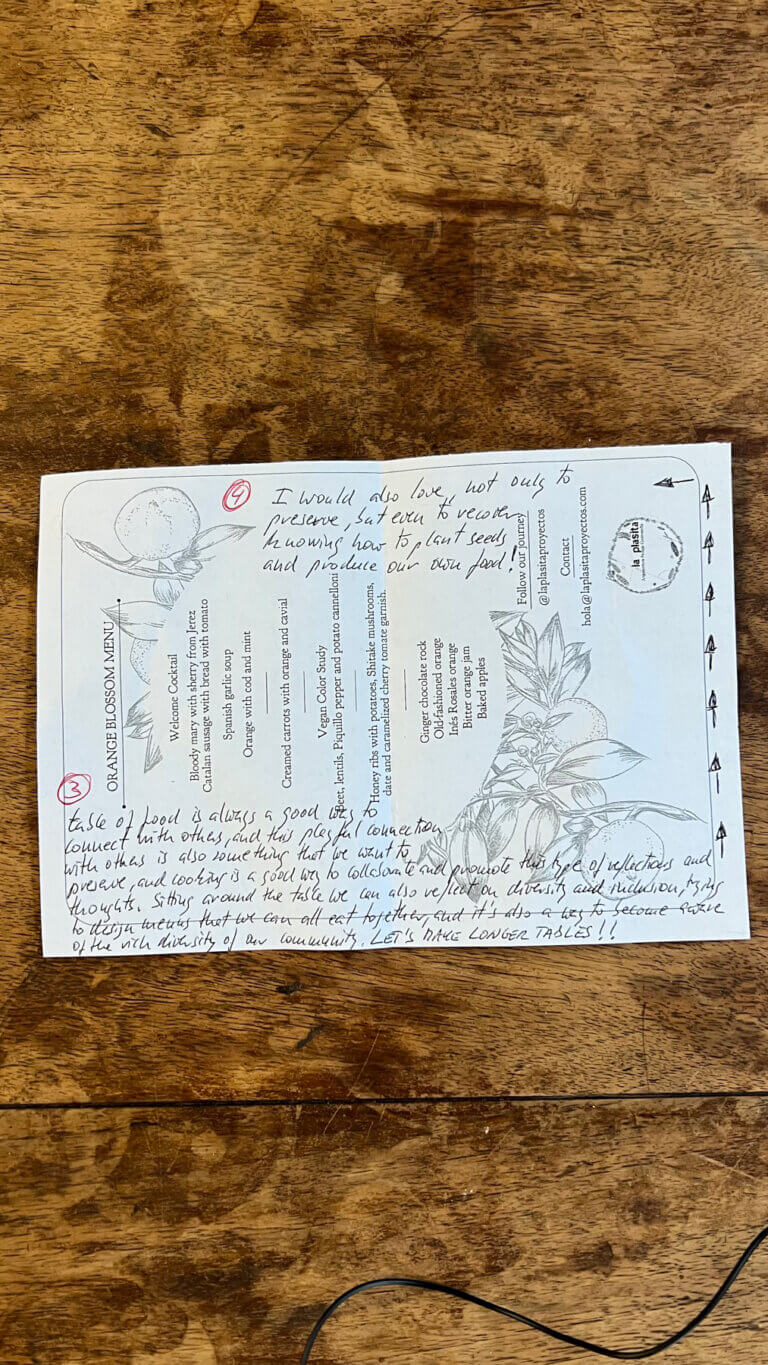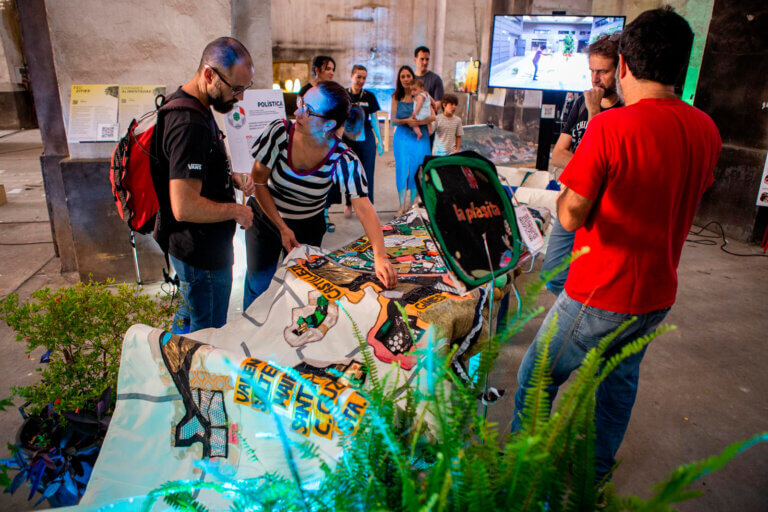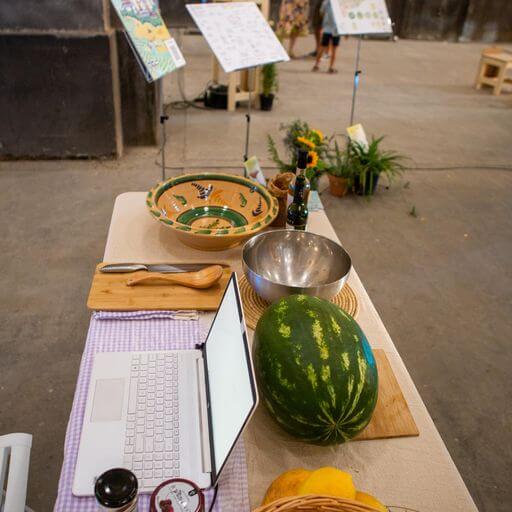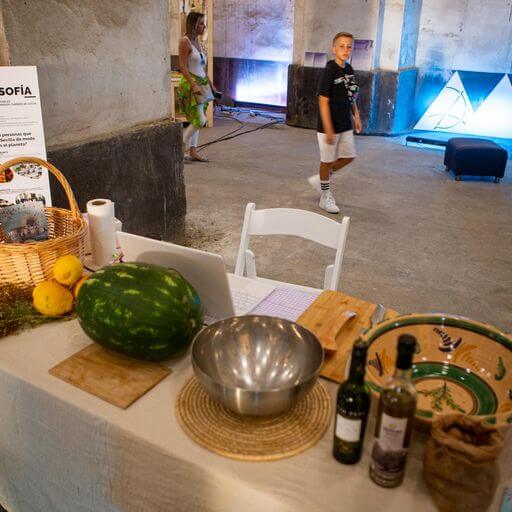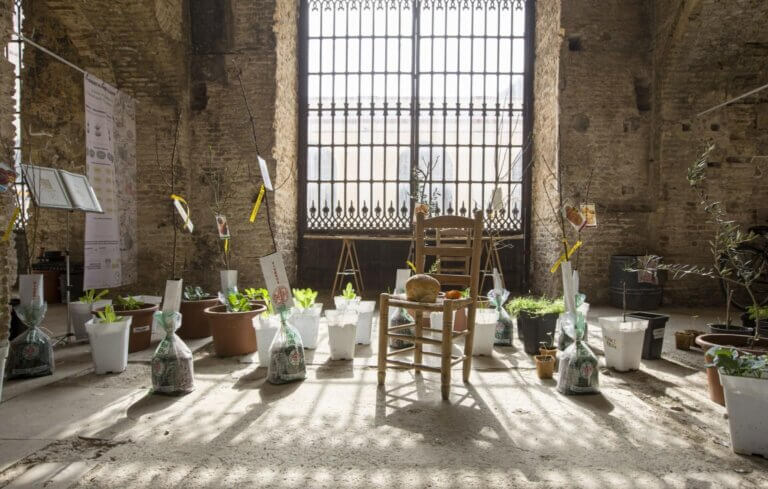Lilian Weikert
Let’s make longer tables
With this message, I aim to preserve and foster the ability to imagine, both a possible and an impossible fair and sustainable present and future. A better present and a better future. I strive to preserve the ability to create narratives to make these futures accessible to everyone. By applying utopian thinking to reinforce critical thinking about food, we can democratize the ability to imagine better futures through cooking, by reflecting on how we eat in the cities, what our food systems are like, and how our relationship with the countryside is. Since we all have a relationship with food, we all eat, almost all of us shop, and some of us, cook. In this way, by reflecting on food sovereignty, we can all participate and democratize utopian thinking and raise awareness on how we live, and we take responsibility for our lives. Preserving some of the ancient recipes and ingredients throughout our history can help us firmly connect our future to the past. We can reshape things, tools, solutions, methodologies, narratives, and so on that were useful in the past and reuse them in the future, adapt them to this possible and impossible better future that we want to imagine. Through food preparation and cooking, not only do we eat and provide solutions to the physical need, but we also promote a better type of relationship through commensality that can help us to create a low tech, low resource consumption knowledge network. Celebrating around a table of food is always a good way to connect with others, and this playful connection with others is also something that we want to preserve. And cooking is a good way to collaborate and promote these types of reflections and thoughts. Sitting around the table we can also reflect on diversity and inclusion, trying to design menus that we all can eat together. And it is also a way to become aware of the rich diversity of our community. Let’s make longer tables. I would also love not only to preserve but even to recover, knowing how to plant seeds and produce our own food. This is my message that I will put in the bottle.
We work in La Plasita with the concept of gastrosophy that we want to define as a type of care theory or around the food and how we eat. And focused on how we eat in the cities because we think that cities are like food deserts. We don’t have direct access to the food or to the food production. And we also think that our food, our current industrial food systems are not healthy, not for us and not for the planet. And we also think that we have to re-imagine or redefine our relation to the countryside, because the countryside is not only the pantry of the cities, but it is also a lot of other things. Good things that we don’t know how to value and we have to try to revalue them again. So we work with what we call poetic research on food and cities, and we try to also raise awareness to our citizens or participants in our actions through art or through artworks on these issues. Our last work that we started before the pandemic in 2019, I think it’s called “El Gran Textil” (The Big Textile). It’s a fabric artwork about participatory fabric artwork that we have been sewing with vet schools and also with other participants in this kind of workshops that we run. And it’s like a textile or fabric cartography of the metropolitan area from Seville, and with an utopian view of how we could eat in the next future or in the present in the city.
The things that we want to do, we have to do them
Maybe we have learned during this journey that the things that we want to do, we have to do them. So we cannot wait to have public funds or grants or something like that because this can be a nightmare and can also make you don’t do the project. What we know is if we want to do it, we have to do it. Also, if we don’t have this support from public institutions or from other stakeholders, to know how not to lose the passion that we have. And also, sometimes we have to let one project sleep… and then maybe we retake it again in the future when we have the energy. So we have the money or we have the connections or the people participating in the project. And sometimes these projects that are sleeping, they disappear and it’s okay also. No, it’s not a it’s not a failure. It’s on or one project that is sleeping develops to another project or becomes a part of a bigger project. It’s also very nice to find partners in the projects and this is not easy. And it’s also good to respect the energies and the engagement from the other partners, to know and not to expect that they will put the same energy as you put in the joint project.
To imagine the good things that could happen or that we can make happen
We are working to imagine better or other possibilities for the future or for the present. Not only for the future, because we have to change things now, so it’s necessary not only to think in dystopia, but also in utopia. It’s not only to think about the bad things that are going to happen if we do not change things, but also to imagine the good things that could happen or that we can make happen.
We work locally in Sevilla because we live here and it’s the territory that we know
We work locally in Sevilla because we live here and it’s the territory that we know. And you also hear our English is not very good… but the problems or the issues or the things that we have to solve here are more or less the same in most of the other European cities, probably also in the American cities. I don’t know if some other continents have similar issues, but most probably just so. The food, the food systems, we have are global and are not good. So the same problem. We can try to work on the problems locally in Seville, but I think they can be then exported [extended] to the other territories of the planet. So this is why we work here. but thinking that the solutions we design here maybe, could be, also applied in other places of the world.
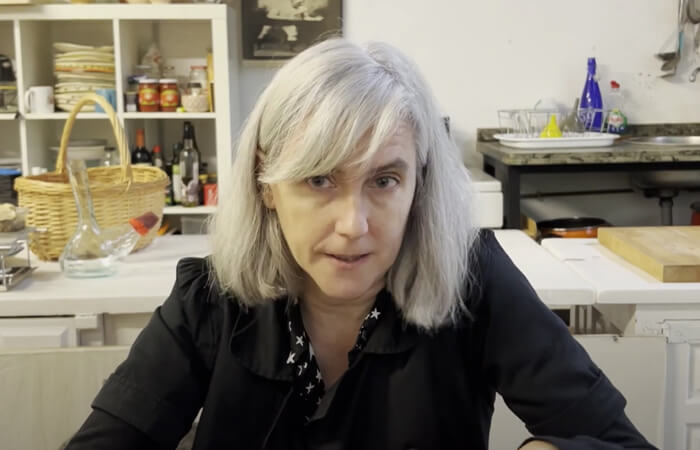
About Lilian Weikert
Lilian Weikert is part of La Plasita, since 2009, has been investigating the relationship between cities and food. We try to respond to three main issues: – How to solve the fact that cities are food deserts, – how to transform the food systems that are harmful to our health and to that of the planet, – how to reimagine the relation among the urban and the rural, a dichotomy relation where the cities do not acknowledge the values of the countryside. In this scenario we consider: How is the city we want fed? How to articulate a new form of relationship between the countryside and the city? To put ideas into action we work with the concept of _GASTROSOPHY_. We understand it as: A philosophy of food as Nietzsche claimed in “The Gay Science” (1882); A care theory around food; An analysis methodology for decision making in planning.
We want to include the perspective of food in a holistic way in urban planning and land management. Food sovereignty and a locally based agroecological perspective guide our work with a socio-cultural perspective. We apply ART and UTOPIA as a mechanism for raising awareness and as a lever for direct action to transform the WORLD.
CreaTures resources
Gemma Lawrence and Emma Hall (2022). Transforming Futures through Place-based Creative Practices: How eco-social change can be fostered in place. Report by Creative Carbon Scotland, commissioned by CreaTures.
Dolejšová, M., Wilde, D. Choi, J.H., Botero, A., Zamuruieva, I., Light, A., Gi, F.G.l & Miller, M. (2022). The Feral Gift Exchange [Festival presentation]. Uroboros 2022 Festival.
Light, A. (2022). On Participative Intimacies and Other Invisible Achievements. Keynote at Participatory Design Conference 2022. Newcastle, UK.
Choi, J. H-j., Botero, A., Ampatzidou, C., Beavers I., Dolejšová, M., Jain, A. & Lohmann, J. (2021). Re-membering with Fantastic Creatures. [Conference presentation]. Eco-creativity: Art, Music, Ritual and Global Climate Politics. 19 Nov 2021, Milton Keynes, UK.
Dolejšová, M., Gaalen van S., Wilde, D., Davis, H. & Altarriba Bertran, F. (2021). More-than-Human Food Futures Cookbook. RRI Tools collection.
